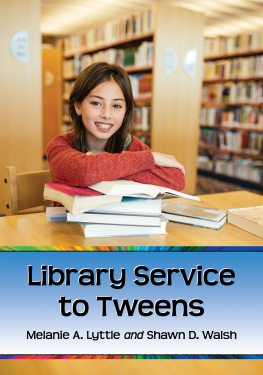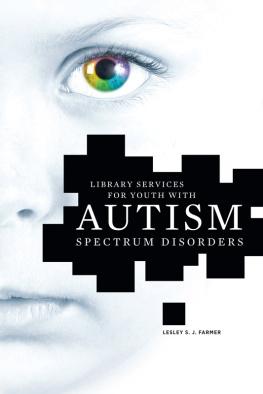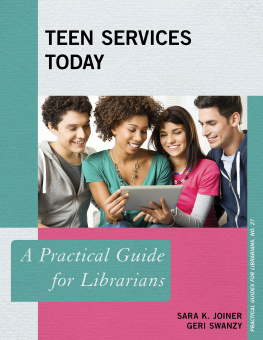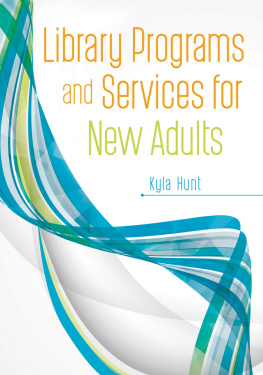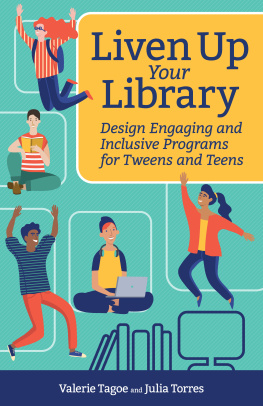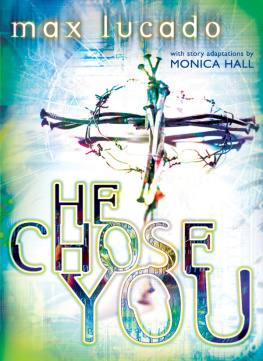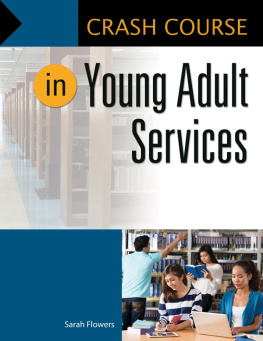
Library Service to Tweens
Melanie A. Lyttle and Shawn D. Walsh

McFarland & Company, Inc., Publishers
Jefferson, North Carolina
e-ISBN: 978-1-4766-2574-4
LIBRARY OF CONGRESS CATALOGUING DATA ARE AVAILABLE
BRITISH LIBRARY CATALOGUING DATA ARE AVAILABLE
2017 Melanie A. Lyttle and Shawn D. Walsh. All rights reserved
No part of this book may be reproduced or transmitted in any form or by any means, electronic or mechanical, including photocopying or recording, or by any information storage and retrieval system, without permission in writing from the publisher.
Front cover photograph 2017 kate_sept2004/iStock
McFarland & Company, Inc., Publishers
Box 611, Jefferson, North Carolina 28640
www.mcfarlandpub.com
To the children and tweens of Madison Public Library
for inspiring us to always provide the best library
experience possible.
To our families for all their love and support.
Acknowledgments
We know that people often skip the acknowledgments, but we wanted to include one anyway. There are many people who in one way or another made this book possible, and publicly thanking them is important to us.
Well start with a huge thank you to the Lawrence, Moran and Wade families. Without their oldest children being loyal library patrons from when they started attending Li-Beary Babes at ten months old, we wouldnt have begun to wonder how to keep them loyal patrons of the library as they were growing older and becoming tweens. Likewise, without these children, we never would have embarked on the journey of tween services, and this book would never have come to be. The parents of these children trusted us to take care of them, and when we asked these parents to allow their children to form the core of our first tween advisory group when they were barely tweens, they said yes. We cannot thank you enough.
An extra thank you to JD because, without you, Miss Melanie would have known nothing about Pokmon. Your confidence that she would be able to get what was needed for the library if she just followed your directions means more to her than you will ever know.
Thanks to the entire staff at Madison Public Library in Madison, Ohio. We experiment all the time with different program ideas and arrangements for the collection. We try different outreach locations and apply for grants to get someone else to pay for our experiments. You have celebrated our successes with us and consoled us during failures. An extra shout-out goes to Dawn Weaver, Deanna Bottar, Jenny Vernyi, and Nick Mayer, who are also part of the current team providing materials and programs for tweens.
Thank you to Nancy Currie, our director, as well as our library board. Your support has been so important to us. We could not do what we do if we did not have your backing.
Thank you to Carrie Svigel, president of the Friends of Madison Public Library, and all those who donate their time and talents to Friends activities. The money you raise ultimately gets returned to the library through monetary donations for special programs like tween lock-ins. We really appreciate your support.
Finally, thank you to Janet Ingraham Dwyer, Amanda L.S. Murphy, and Robyn Vittek for giving us feedback as we worked on the manuscript. You helped us convey our message as clearly and completely as possible.
Introduction
The Importance of Talking about Tweens in the Library
Currently there is very little information available on tween library services. It is helpful to everyone in the field to share the successes, failures, and learnings that come from providing services to this changeable and often perplexing group of patrons. Through exchanging knowledge, library staff can gain confidence and knowledge to provide exceptional tween library services.
There are plenty of amazing articles and blog postings about tween services, and they give a wealth of good things to think about. There are also libraries that have parts of their websites devoted to Teen and Tween Services. But where is the how to book? Ideally, this book answers that question. Our goal is to help others organize their thoughts about what tween services in their community will look like. This present work is designed to move through a variety of areas to create a smooth, logical progression of developing tween library services.
As authors, we never imagined that we would write about library services for tweens. However, we both believe that we have in our community some of the most amazing, caring, awesome tweens ever, and they deserve the best from their library. Providing those library services is what we do. Through this book, we share our learnings and observations.
Part of the magic of tween library services, and what makes this area unlike any other in the library, is that it frequently does not follow any patterns or preconceived ideas. The needs of tweens vary from community to community. Tweens are always evolving, and everywhere unique. Looking back, developing tween services at our library was a messy and chaotic process. From designing programming to creating a separate tween materials collection to simply trying to figure out who was a tween in the community, nothing has been as straightforward as we hope it will be for readers of this book.
Tweens deserve their own spaces and services, and some of them expect it. If readers are fortunate enough to have children growing up in libraries and believing their library should serve them and their needs, then theyre off to a great start. However, pioneering tween services as a library can be lonely. This book is intended to show such intrepid pioneers that there are others who have been there and want to offer help and advice.
Our final word before proceeding is that we have made mistakes, and so will you. Learn from our mistakes and learn from your own. Mistakes are not failures, but opportunities to learn and to do better in the future.
1
Developmental and Educational Psychology
The discussion of tweens begins by looking at who they are from an educational and developmental psychology perspective. However, to begin the immersion into the world of tweens, it makes sense to consider tweens most common method for searching for information, aside from asking their peers: they google it or use whatever web browser is at hand. Their search methods often bring up Wikipedia articles and things that many librarians might question as being the most reputable and reliable sources of information. However, growing up in this world of constant connectedness, with everything being on the Internet, significantly influences who tweens are. They are an ever-evolving and difficult-to-describe group of individuals.
Wikipedia will serve as a great resource throughout this stage of research for reasons other than being what tweens use. Once upon a time, the World Book Encyclopedia, shelved in the reference section of practically every library, was the first place people went to get a broad understanding of a topic or idea. That encyclopedia seemed to have at least a little bit of information on everything. Now, however, Wikipedia has for many people become the go-to source for clear, concise explanations of complicated topics. Another advantage to Wikipedia is that someone is updating, adding, or clarifying entries all the time. Whether librarians want to admit it or not, Wikipedia is also fairly reliable (to a certain point), and often offers easy routes to further exploration of a topic. With these ideas in mind, the topics and ideas that are touched on briefly in the following pages have been described in much detail on
Next page
